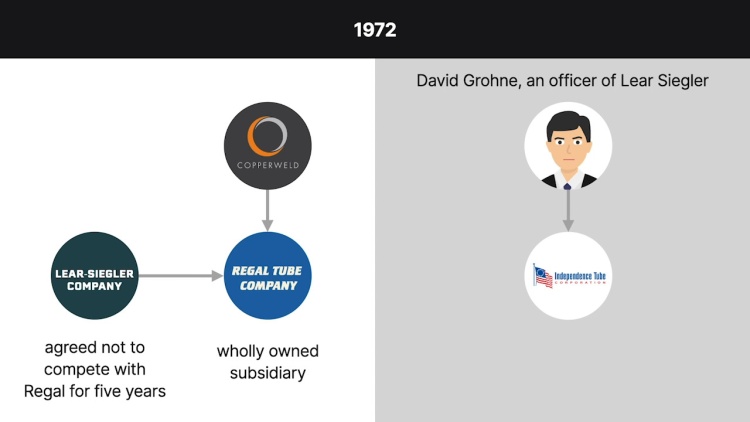Copperweld Corp. v. Independence Tube Corp.
United States Supreme Court
467 U.S. 752 (1984)
- Written by Nicholas Decoster, JD
Facts
In 1972, David Grohne established Independence Tube Corporation (Independence) (plaintiff). Independence was a potential competitor of Regal Tube Company (Regal) (defendant) in the market for steel tubing. Regal had previously employed Grohne as an executive while under ownership by Lear Siegler, Inc. After Regal was purchased by Copperweld Corporation (Copperweld) (defendant), Grohne continued to work for Lear Siegler under an agreement stating that Lear Siegler and its employees, including Grohne, would not compete with Regal for five years. Independence attempted to purchase supplies from Yoder Company (Yoder) to start doing business, but Copperweld informed Yoder of the non-compete agreement that Grohne had signed. As a result, Yoder voided Independence’s purchase order, and Independence’s business operations were delayed for nine months. In response, Independence brought a suit against Copperweld and Regal, alleging that the two entities had conspired for anticompetitive purposes in violation of § 1 of the Sherman Act. A jury found in favor of Independence and awarded damages. Copperweld appealed the decision, arguing that Copperweld could not be guilty of conspiring with an entity owned by Copperweld. The court of appeals affirmed, holding that antitrust liability could attach to two entities considered to be independent actors. Independence appealed, and the United States Supreme Court granted certiorari to determine whether the coordinated acts of a company and its wholly owned subsidiary could constitute an agreement or conspiracy in violation of antitrust law.
Rule of Law
Issue
Holding and Reasoning (Burger, C.J.)
What to do next…
Here's why 904,000 law students have relied on our case briefs:
- Written by law professors and practitioners, not other law students. 47,100 briefs, keyed to 995 casebooks. Top-notch customer support.
- The right amount of information, includes the facts, issues, rule of law, holding and reasoning, and any concurrences and dissents.
- Access in your classes, works on your mobile and tablet. Massive library of related video lessons and high quality multiple-choice questions.
- Easy to use, uniform format for every case brief. Written in plain English, not in legalese. Our briefs summarize and simplify; they don’t just repeat the court’s language.





